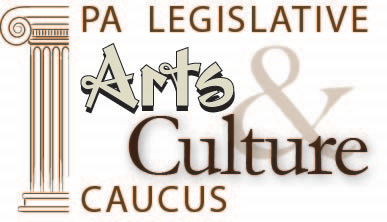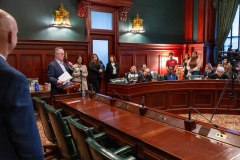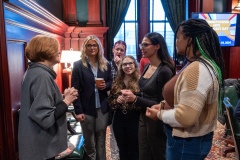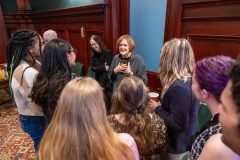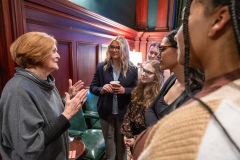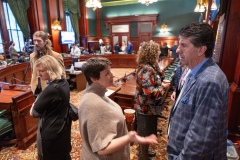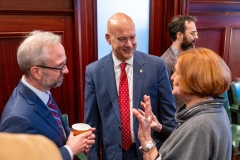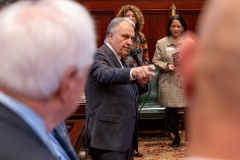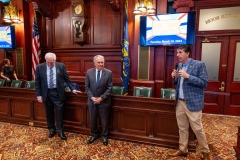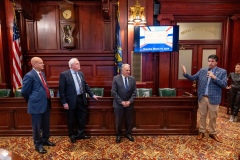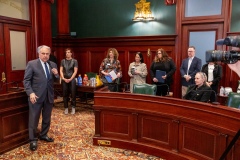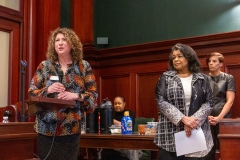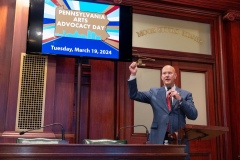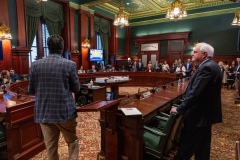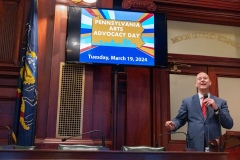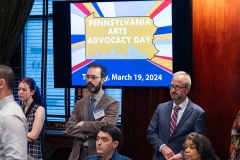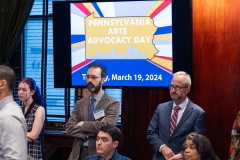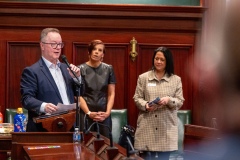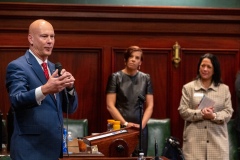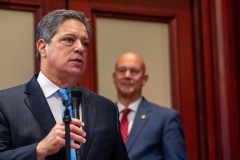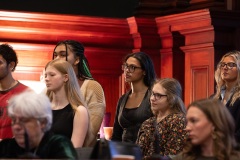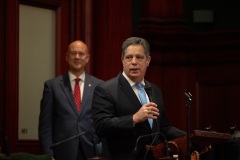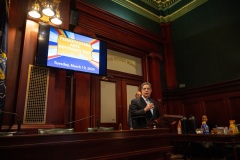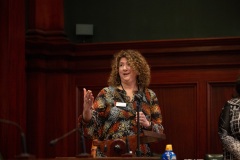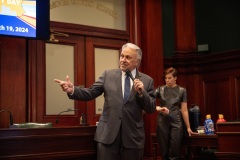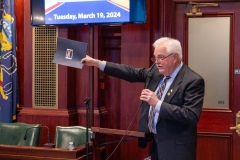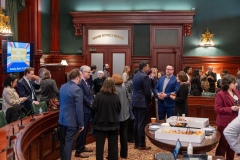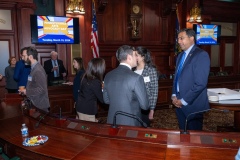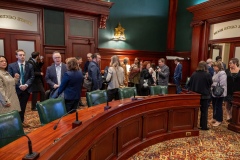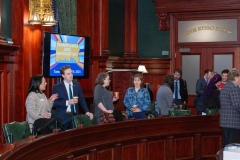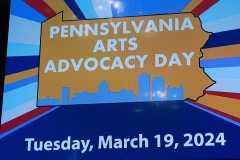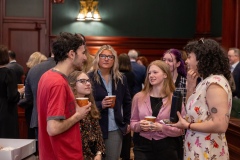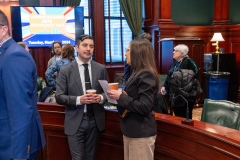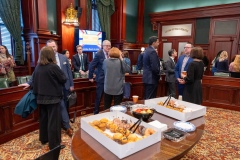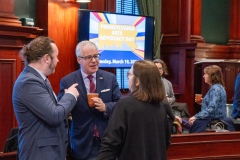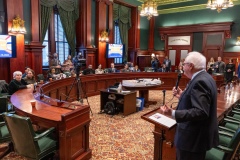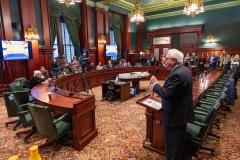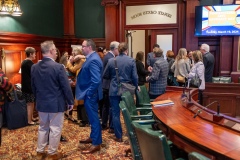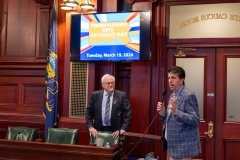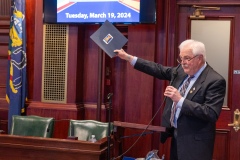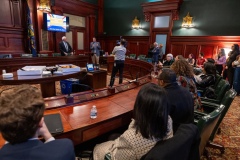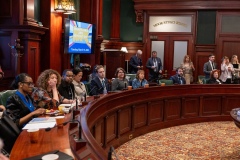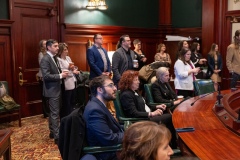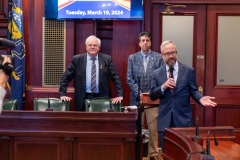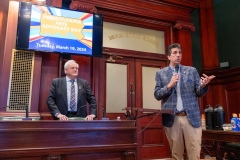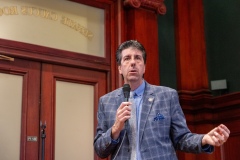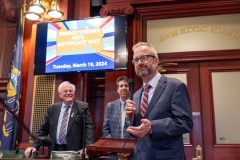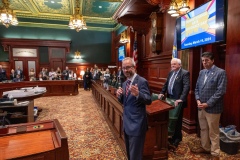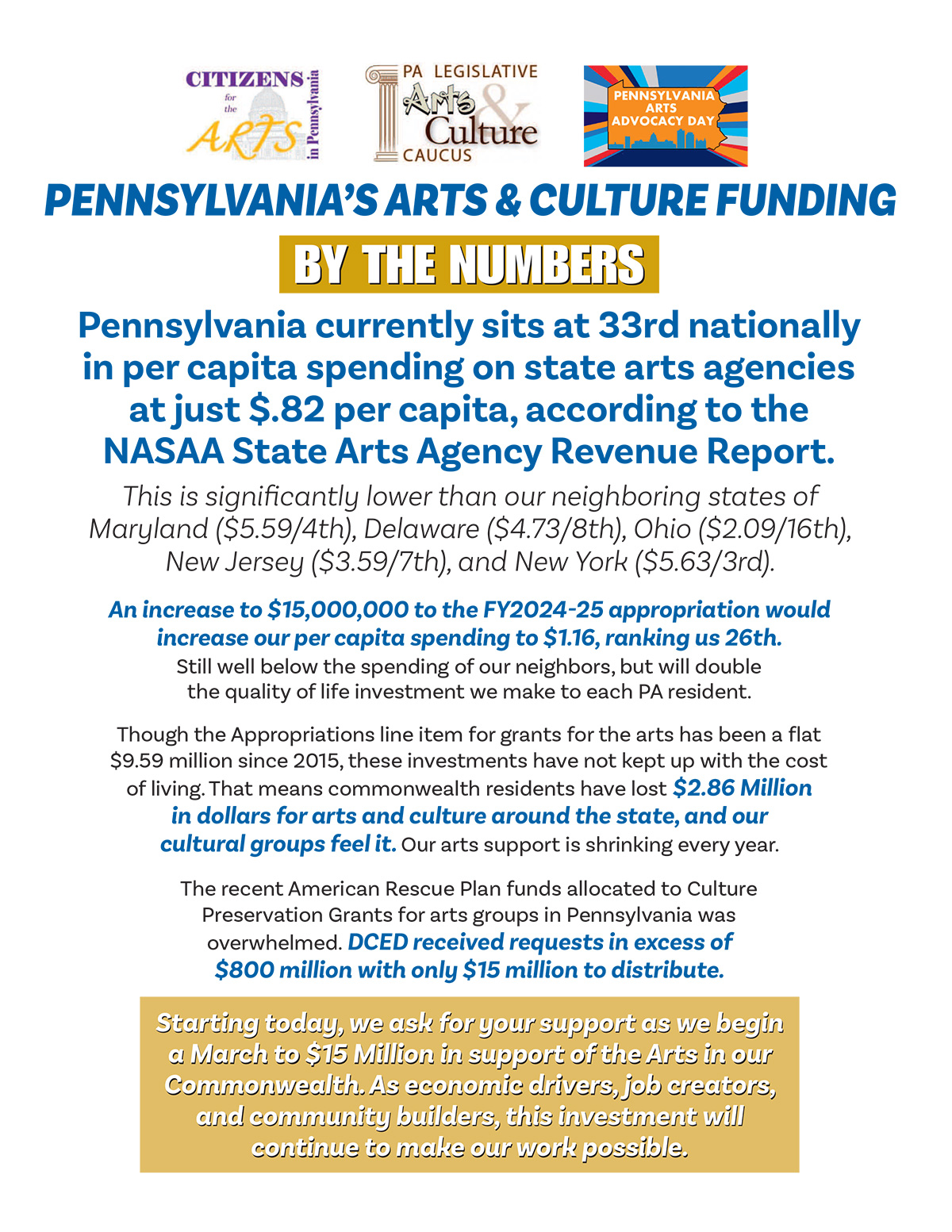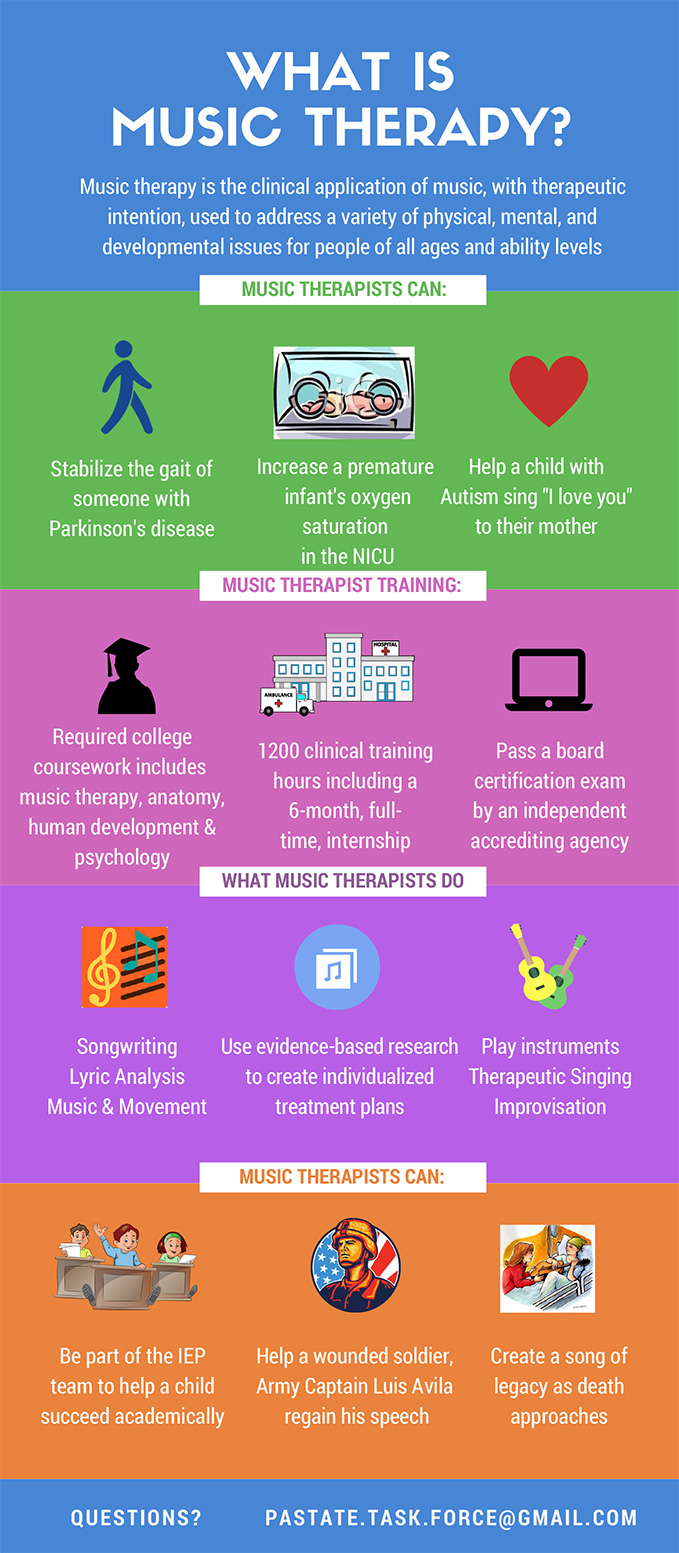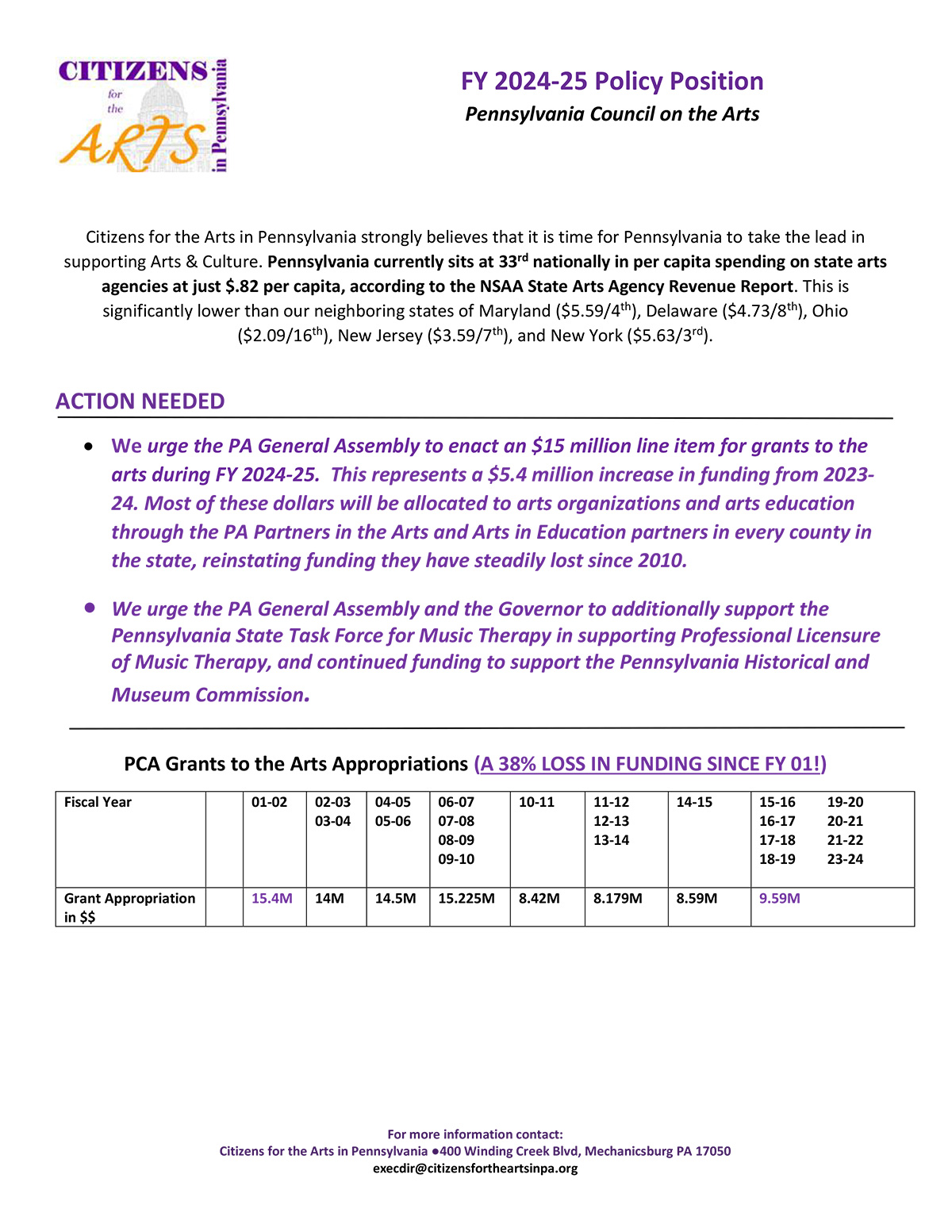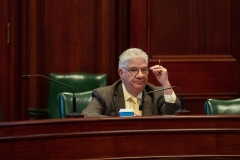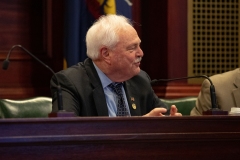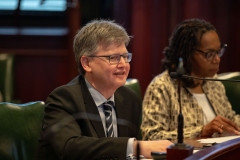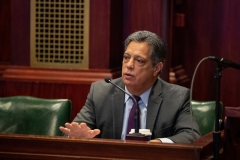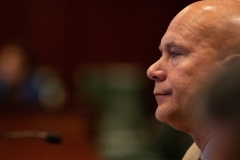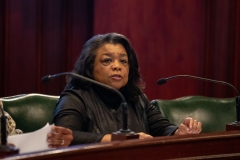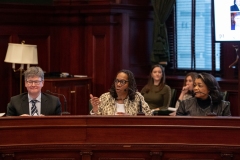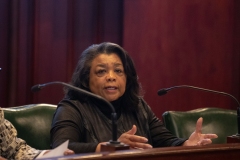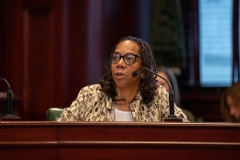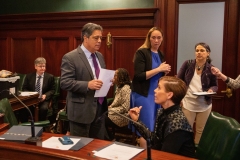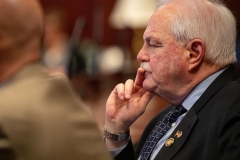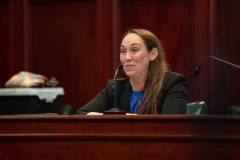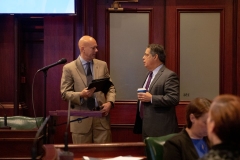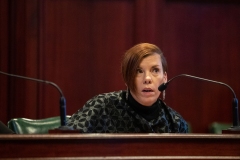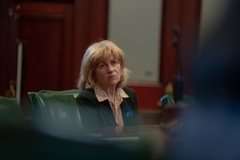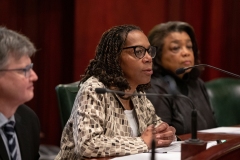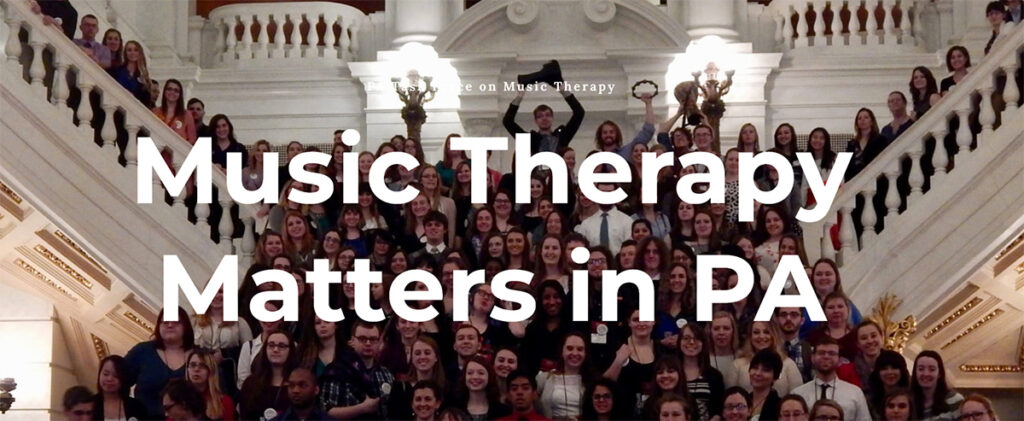Meetings
Arts Advocacy Day :: March 19, 2024
PA Arts and Culture Caucus Celebrates Arts Advocacy Day, Features Local Artists, Calls for Continued Investments in the Arts
HARRISBURG, PA – March 19, 2024 − Today, members of the Pennsylvania Legislative Arts and Culture Caucus gathered to celebrate “Arts Advocacy Day” along with Citizens for the Arts in Pennsylvania, a nonprofit advocacy group.
The four co-chairs of the caucus – Senator Jay Costa, Senator Pat Stefano, Representative R. Lee James, and Representative Joe Ciresi – joined advocates to praise the artists who contribute their talents to their communities, and called for continued investments in arts and culture in order to boost local economies, tourism, and downtown revitalization.
“There’s power in numbers and it’s so encouraging to see advocates from all corners of Pennsylvania come to the capitol to shine light on the vast impact of the arts,” said Senator Pat Stefano. “Support for the arts provides an opportunity for economic growth, as the arts touch multiple industries across the commonwealth. An investment in local art is an investment in our local businesses, so funding creative endeavors propels our economy to thrive.”
“I’m honored to add my voice to the chorus of leaders and activists lifting up our artists,” said Senator Jay Costa. “Supporting the arts means supporting our communities, our economies, and our families. I look forward to working with my colleagues in the legislature to continue supporting those advancing arts and culture in Pennsylvania.”
“The arts are an essential part of our lives and the fabrication of our world,” said Rep Ciresi. “We must continue to support our local art organizations, not only for the goodness of our souls but for the economic impact they bring into our society.”
“The Arts inspire,” said Rep. R. Lee James. “The Arts provide cultural knowledge for future generations. The Arts are ageless.”
“PA CultureCheck, our study with Greater Philadelphia Cultural Alliance, highlights the innovation and creativity of Pennsylvania’s cultural organizations and their need for additional support as they face ongoing economic challenges and changing audiences,” says Laurie Zierer, executive Director of PA Humanities.
“Pennsylvania’s vast arts and culture community are facing multiple challenges of increased operational and programming costs, changes in attendance and uncertain revenue streams. Now is the time for increased state support to stabilize creativity, tourism, and arts education across the Commonwealth,” said Mitch Swain, Citizens for the Arts in PA
Footage of today’s presser is accessible here.
More information about the caucus is available at PAArtsCultureCaucus.com.
####
Arts and Culture Caucus Meeting & Networking Breakfast – December 12, 2023
Agenda
I. Opening Remarks from Caucus co-chairs
II. Introduction of new Executive Director for Citizens for the Arts, Kelley Gibson, York Cultural Alliance
III. Remarks from Pennsylvania Council on the Arts
IV. Networking time with legislators and attendees
Arts and Culture Caucus Meeting :: June 6, 2023
Agenda
I. Welcome − Caucus Co-Chairs
II. Presentation from Kendra Whitlock Ingram, Pittsburgh Cultural Trust
III. Presentation from Pennsylvania Council on the Arts
IV. Discussion and networking
Arts and Culture Caucus Meeting :: May 3, 2023
Agenda
I. Welcome − Caucus Co-Chairs
II. Arts Advocacy Day Recap
III. Introduction of Speakers − Pamela J. Snyder Etters
IV. PA Humanities – Dawn Frisby Byers, Senior Director of Content and Engagement at PA Humanities; Nicholas Crosson, Development and Research Manager at PA Humanities; Patricia Wilson Aden, President and CEO of Greater Philadelphia Cultural Alliance.
a. PA Cultural Sector at a Crossroads: Needs, Impact, and Influence
V. Pennsylvania Music Therapy Task Force – Melanie Walborn, Managing Partner of WB Music Therapy
a. Music Therapy Licensure in Pennsylvania: What is it and why is it needed?
VI. Question and Discussion Period
VII. Final Remarks
PA’s Cultural Sector at a Crossroads: Needs, Impact, and Influence
 Loading...
Loading...
Pennsylvania Music Therapy Task Force
 Loading...
Loading...
Arts and Culture Caucus Meeting :: November 10, 2021
On Wednesday, November 10, 2021, the first in-person meeting of the PA Legislative Arts & Culture Caucus took place in the PA Capitol since spring 2020. The following is a summary of the presentations given at the meeting:
Veteran Specific Therapeutic Arts Programming
Presenters Donna Gority and Mike Quinn provided insight into an upstart Veterans specific “art as therapy” program taking place in Altoona, PA (Blair County). With a high veteran population, the local arts center, ArtsAltoona, has spearheaded an effort to bring to life veteran specific programming. The Comedy Boot Camp Program is managed by Mike Quinn, a retired combat veteran. The goal of this class is for participants to experience personal growth and self-confidence by making an investment in themselves. “We are much more than a classroom – we are an inclusive community that facilitates a safe space for veterans to make lasting connection.” This program is designed for those who want to learn the art of stand-up comedy, as humor and laughter opens one’s mindset to invite positive social exchanges. Participants will gain confident public speaking skills, creativity, writing skills, resilience, a sense of purpose and a feeling of belonging. The John F. Gority Academy for Veterans does this through the restorative power of comedy, storytelling, and creative expression.
To learn more about this program, please visit the ArtsAltoona website: www.artsaltoona.org/gority-academy-stand-up-comedy-bootcamp/

Art as Therapy – I’m Fine Project
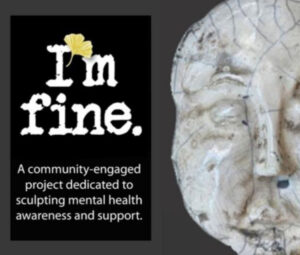 Presenters and Co-curators of the I’m Fine Project, Carrie Breschi and Maureen Joyce, initiated I’m fine. in 2019 as a way to address the country’s mental health crisis.
Presenters and Co-curators of the I’m Fine Project, Carrie Breschi and Maureen Joyce, initiated I’m fine. in 2019 as a way to address the country’s mental health crisis.
“I’m fine.”, a phrase we often say when we are not fine, is a community-engaged project dedicated to sculpting mental health awareness, support, and healing through the visual arts.
I’m fine. consists of a series of workshops developed in communities across Pennsylvania. In the workshops, participants express their emotions by creating a ceramic mask to represent the mask they wear to overcome, portray or minimize their mental health struggles. The workshops culminate in each community with a series of public art installations and gallery exhibits. All installations showcase the masks and the meaningful stories of the participants. To date, more than 300 masks have been created and more than 20 workshops have been conducted.
The project made its debut in Carlisle, PA, and is currently being conducted in York, PA until May 2022. I’m fine. will continue to engage communities across Pennsylvania until 2024 when it will be shown in the state’s capitol of Harrisburg, bringing everyone together to engage in the mental health conversation.
To learn more about this program, please visit the “I’m Fine.” website: www.imfineproject.com
Music Therapy
Presenters, and Co-chairs of the Pennsylvania State Task Force for Music Therapy, Michelle Muth, MT-BC & Nicole Hahna, Ph.D., MT-BC led a presentation sharing their current practices of music therapy throughout the Commonwealth, the extensive educational background needed to be a board-certified Music Therapist, and ways the legislature could support and actively advocate for access to music therapy services.
Minimum training for a Board-Certified Music Therapist (MT-BC) includes:
- 4 year undergraduate degree in music therapy (or equivalency)
- 6-9 month internship with 1200 clinical hours
- Passing a national board certification exam (www.cbmt.org) to earn credential MT-BC
- Following Code of Ethics & Standards of Clinical Practice
- Ongoing education credits to maintain board certification – 100 credits every 5 years, including ethics credits
Currently a group of 6-7 board certified music therapists volunteer on the Pennsylvania State Task Force for Music Therapy (PASTF) focusing on increasing access to qualified and safe music therapy services across the state. They seek state recognition for the music therapy profession and the MT-BC credential required for competent practice. Serve in role as state association for music therapy as there is not currently a music therapy state association. Their efforts have resulted in:
- Music Therapy being added to various waiver programs
- A collaboration with HAP (The Hospital and HealthSystem Association of Pennsylvania) on the Music Therapy Collaborative to bring music therapy to Health care Workers
To learn more about this program, please visit the PASTF website: www.pamusictherapy.org
Sector Updates - President and CEO of the Carnegie Museums.
Steven Knapp
Presenter Steven Knapp provided an update on the recovery efforts of the Arts and Culture Sector. As the President and CEO of one of PA’s largest museum collectives, Steven was able to share solid insight into both the operations of our culture assets, and the publics response to reopening efforts.
While all institutions took a significant financial hit during the pandemic, he felt there were also a lot of positive managerial take-aways. Both large and small institutions/ organizations managed to “pivot their practices and found creative ways to provide extensive and innovative online programming; and most continue to offer robust digital programming today!”
“The fact that we are able to move forward is due in no small measure to the support that kept us whole during the worst days of the pandemic.” Perhaps the most crucial source being the support through the Cultural and Museum Preservation Grant Program. The Carnegie Museums were fortunate to be included among the beneficiaries of this program last year, and earnestly hope that the Commonwealth will resume the program this year, making a portion of Pennsylvania’s share of the American Rescue Plan funding available to a wider range of institutions than was possible last year, including PCA grantees in addition to those previously eligible. “Such an action would provide invaluable aid to the institutions that play so vital a role as partners to schools; prominent tourist attractions; economic drivers; and cherished sources of inspiration, information, and respite for Pennsylvania’s citizens and families
Arts and Culture Caucus Meeting :: May 1, 2019
Agenda
I. Welcome − Caucus Co-Chairs
II. Introduction of Presenters − Jenny Hershour
Gail Harrity, President and COO of the Philadelphia Museum of Art
David Mickenberg, President and CEO of the Allentown Art Museum
Abby Baer, Executive Director of the Demuth Museum and the Lancaster Museum of Art
III. Arts and the Recovery Process – Mary Brenholts, Amber Coppings, and Darby Testa
This is year two of this Pittsburgh Center for Arts and Media Long Term Residency Project in partnership with POWER (PA Organization of Women in Early Recovery) continues to help the women in POWER House programs to experience life in recovery with new tools to help heal and build confidence while developing real-life creative arts and entrepreneurial skills. The goal is to allow the women to experience the creation of art from the conception of an idea, immersing one’s self in the process, creating a product, and selling/exhibiting work to the public. This encompassing project is designed to provide a safe and encouraging space to enhance and improve the women’s lives during their journeys of recovery.
IV.Artist Residencies in State Veterans’ Homes – Jamie Dunlap, Arts in Education Program Director – Pennsylvania Council on the Arts
Ms. Dunlap will be highlighting a project done in partnership with the Pennsylvania Department of Military & Veterans Affairs and the PCA.
V. Q & A
VI. Final Remarks
Arts and the Opioid Epidemic
 Loading...
Loading...
Cultural Caucus Presentation
 Loading...
Loading...
Pittsburgh Center for Arts & Media Overview

Pittsburgh Center for Arts & Media
Pittsburgh Center for Arts & Media (PCA&M) is committed to the artist and the advancement of artistic excellence in visual arts – specifically film, digital video, photography, media, and fine and creative arts and crafts; the provision of equipment and facilities for artists; the conduct of instructional programs; and the stimulation of public understanding and awareness through exhibitions, demonstrations, and sales.
Visual, Literary, and Media Arts Education
PCA&M offers community arts educational experiences in visual, literary, and media arts on-site at our Shadyside campus. Our approach to arts education and art making provides a balance between process and product and student progress is measured in terms of personal artistic growth, the acquisition of new skills and the ability to think critically.
Artists in Schools & Communities
Through our partnership with the Pennsylvania Council on the Arts, Artists in Schools & Communities at PCA&M offers Artist Residency Projects and other vital arts services to schools, community organizations, and nonprofit service agencies working with both children and adults in Allegheny, Beaver, Greene, and Washington counties.
Access Membership
PCA&M Access Membership provides artists with resources, equipment, and facilities for practicing their art.
Exhibitions
PCA&M is the city’s foremost visual arts organization focused primarily on the presentation of contemporary art created in the region. Exhibiting the work of prominent and emerging artists of various visual disciplines, PCAM provides a unique cross section of contemporary art in one location. With the ability to stage multiple exhibits concurrently, a mix of regional and national artists are featured regularly in the Shadyside galleries.
Cinema
PCA&M’s two venues (Harris Theater and Regent Square Theater) offer a range of alternative films that aren’t at the multiplex. Three Rivers Film Festival remains the oldest and largest annual film festival in the region. This exciting celebration features documentaries, independent American films, foreign films, short films, restored classics, and local films. Since September 1998 the Film Kitchen series has been showcasing local and regional short film/video work.
The Shop
The Shop @ PCA&M promotes and sells the work of local and regional artists. We currently represent over 200 artists in disciplines ranging from fibers and print to ceramics and glass.
Select POWER Reflections Spring 2019
Select POWER Reflections Spring 2019
Amber Coppings, Resident Artist
acoppings@gmail.com
Questions:
- How does art affect or change how you think about yourself?
- One thing I learned/One thing I am proud of.
- How does being in the art program affect your perception/thinking about everyday life?
- Something you’ve learned from someone else in the program.
POWERful woman, C.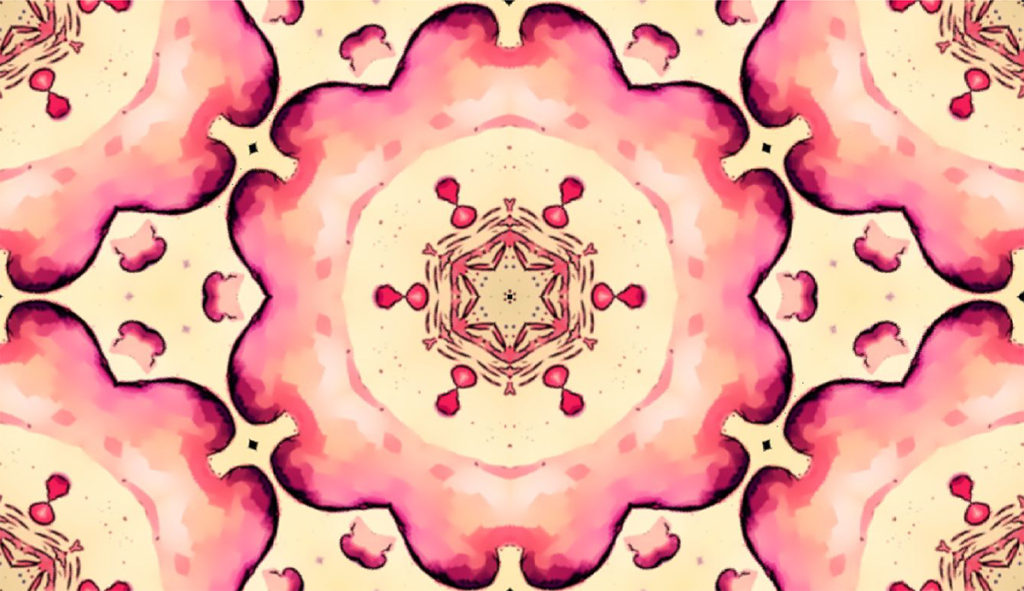
Art makes me feel more creative than I ever imagined. I am terrible at drawing, but there is so much more to art than that.
I’ve learned way more than just one thing. I’ve learned so many things & skills that I can take with me. I am proud that I stayed in the art program & everything that I have done here.
I am able to look at things differently- due to lines, shapes, patterns, colors, and textures. I have a better understanding on how they came to be.
I have learned that we all look at things so differently and (even with) our differences we all ended up with a common, related result.
POWERful woman, J.
I have never thought about myself having a creative or artistic side and I’ve seen a different side of myself: trying new
things and liking how they turned out when I didn’t think I could do it to start with.
I’ve learned that art is very healing and a great outlet for emotions.
I am proud of myself for stepping out of my comfort zone and trying something new.
It has caused me to step back and look at things differently, wondering what people were thinking about or going through when they made certain things. Like the paintings (murals) on the side of buildings and graffiti, for instance. Even though we all had the same instructions, not one piece turned out the same. Each person has their own creative side and every woman here is extremely creative. It’s a blessing to watch each person grow and blossom into stronger women.
POWERful woman, J.
It helps me realize that I’m more creative than I realize and give myself credit for.
I’ve learned that I can have AND be creative without having to use drugs and/or alcohol.
It opens up my eyes to many forms of art & the joy & the creativity it can bring to your life.
I’ve learned that we are all beautiful & unique in so many ways & it really comes out in our Art projects.
POWERful woman, R.
Art makes me look deeper into myself. Making art also makes me proud and to take a different look at colors. Also, (look into) the abstract (nature) of it.
I am proud of being able to escape into the world of art and beauty. I learned that I can block out everything when I’m focused on art.
My perception has changed for the better because my third eye can help me see beauty in some things that I would normally just glance at, or not even see. Now I tend to look at the lines of things and understand part of the process for those creations.
I learned that we have artists in this class, in particular, whose work is worthy of exploration. I also learned that everyone has some artist in them. I get to see the creative part in everyone.
POWERful woman, N.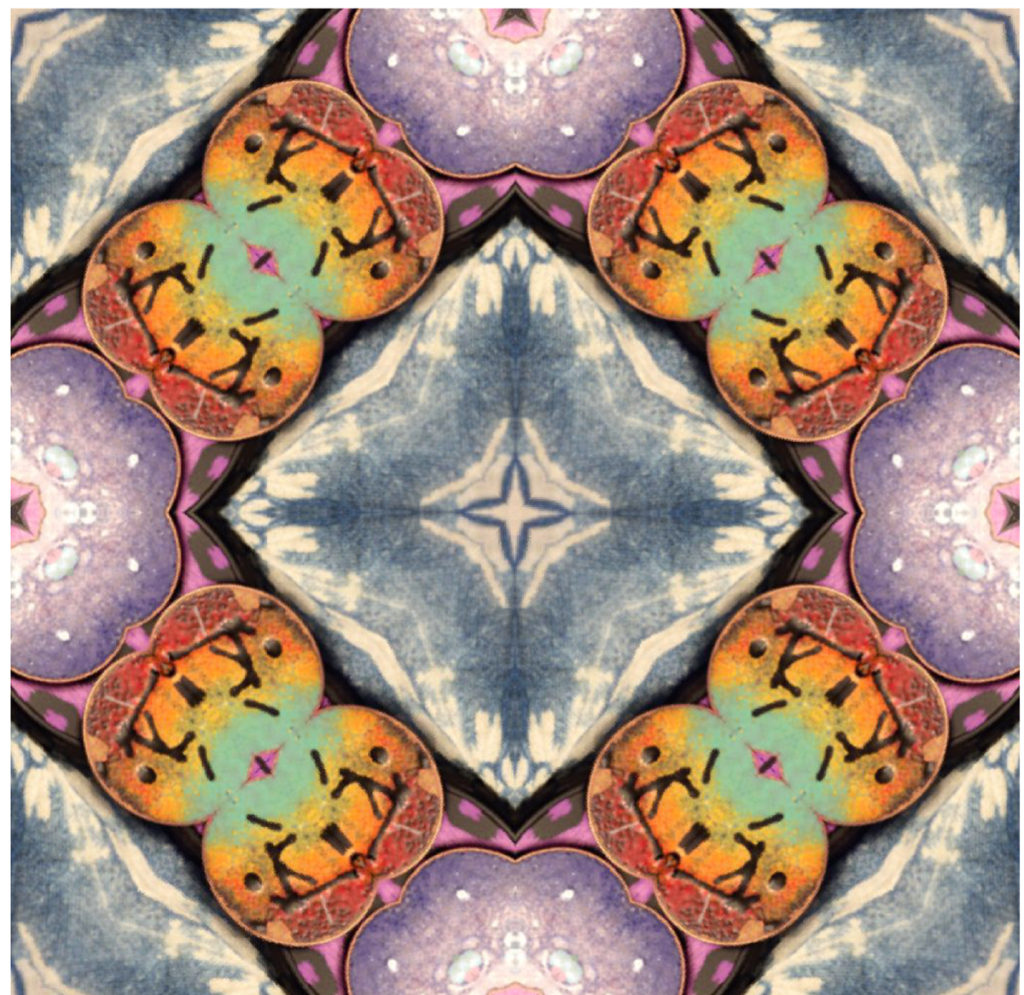
I’ve always loved art, and art was always a part of my life. However, due to my addiction I lost sight of my abilities. Now, I realize again my love and the creativity I once had.
I am very creative, and my art is really good.
I realize how beautiful colors are in nature, animals, clothing, etc…
I have learned people with the disease of addiction are very creative.
POWERful woman, V. Alumni of the POWER program and arts program
- Was the art program an asset to your time in the POWER House? Did having access to the arts help them in their early recovery? If so, how?
Absolutely!! Having something creative to focus on helped a lot with the racing thoughts in the beginning of my recovery. It was good for just narrowing my focus.
- Are you continuing to use art in their lives on their own? If so, how? Are you using art with family members, or at work? If so, how
Yes, on a daily basis. It continues to help soothe my anxiety and focus my thoughts. I currently have several projects that I’m working on. So far, it has just been solo projects, but my niece is starting to express an interest in drawing, so maybe I can use artwork as a way to bond with her. - Have you furthered your learning in the arts? Or, have you pursued any jobs/a career in the arts?
Nothing formal, but I am always reading up on new techniques as well as experimenting on my own. I would beinterested in more formal training further down the road.
Pittsburgh Center for Arts & Media POWER House Long Term Residency Project
 Loading...
Loading...
Arts and Culture Caucus Meeting :: March 27, 2019
Agenda
I. Welcome − Caucus Co-Chairs
II. Introduction of Presenters − Jenny Hershour
Gail Harrity, President and COO of the Philadelphia Museum of Art
David Mickenberg, President and CEO of the Allentown Art Museum
Abby Baer, Executive Director of the Demuth Museum and the Lancaster Museum of Art
III. Introduction of Art Bridges – Gail Harrity and the Philadelphia of Art Curatorial Team
IV. Partner Perspective – David Mickenberg and Abby Baer
V. Connecting Art Bridges to the future of the institutions
VI. Q & A
VII. Final Remarks
Arts and Culture Caucus Meeting :: January 30, 2019
Agenda
I. Welcome − Caucus Co-Chairs
II. Introduction of Presenters − Jenny Hershour
Philip Horn, West Shore Theatre project
He will highlight a renovation project being done on the West Shore Theatre in New Cumberland Borough. This is part of the community revitalization going on in downtown New Cumberland.
Lenwood Sloan, Commonwealth Monument Project
The monument will honor the 8th Ward of Harrisburg (the Capitol grounds sits on what was the 8th Ward). The 8th Ward was an African American community. It will also honor the anniversaries of the 14th and 19th amendments to the U.S. Constitution.
III. Final Remarks
Arts and Culture Caucus Meeting :: September 26, 2018
Why the Arts are Essential to Community Development
 Loading...
Loading...
Arts and Culture Caucus Meeting :: June 13, 2018
Impact of Arts in Education on PA Communities
 Loading...
Loading...
Agenda
I. Welcome
Caucus Co-Chairs: Sen. Browne, Sen. Costa, Rep. Briggs, and Rep. James
II. Introduction of Presenters – Jenny Hershour
Melissa Snyder, Executive Director-Jump Street, Pennsylvania Partners in the Arts (PPA) Partnership
Pearl Schaffer, CEO-Philadelphia Arts in Education Partnership, Arts in Education (AIE) Partnership
III. Final Remarks
Arts and Culture Caucus Meeting :: February 7, 2018
Agenda
I. Welcome
Caucus Co-Chairs – Sen. Browne, Sen. Costa, Rep. Briggs, and Rep. James
II. Recognition of Philip Horn & his 25 years of service to the Arts
Sen. Jay Costa
III. Introduction of Karl Blischke, new PCA Executive Director
Jenny Hershour, Citizens for the Arts in Pennsylvania
IV. Review of cultural line items in Governor Wolf’s Budget Proposal
Jenny Hershour, Citizens for the Arts in Pennsylvania
V. Introduction of Presenters
Jenny Hershour, Citizens for the Arts in Pennsylvania
Wendy Koller, Manager of Education, Reading Public Museum – Sensory Mornings Program for Preschoolers
Anne Marie Rhoades, VP for Advocacy & Strategic Partnership, Greater Philadelphia Cultural Alliance – Agenda: Pre-K study
VI. Final Remarks
Arts and Culture Caucus Meeting :: October 18, 2017
Agenda
I. Welcome
Caucus Co-Chairs – Sen. Browne, Sen. Costa, Rep. Briggs, and Rep. James
II. Arts & Economic Prosperity 5: PA (AEP) – Statewide release of the most current statewide study on the economic impact of the nonprofit arts sector in Pennsylvania.
Jenny Hershour, Citizens for the Arts in Pennsylvania
III. Regional AEP Studies
Allegheny County – Mitch Swain, CEO of the Greater Pittsburgh Arts Council and Chair of the Board of Directors for Citizens for the Arts in Pennsylvania
Philadelphia and the Surrounding Region – Maud Lyon, President of the Greater Philadelphia Cultural Alliance
IV. Economic Impact of the Humanities in Pennsylvania
Laurie Zierer, Executive Director of the Pennsylvania Humanities Council
V. Why the Arts are Essential to Community Development
Jeffrey S. Parks, Chair of the Pennsylvania Council on the Arts and Executive Director of the ArtsQuest Foundation
VI. Final Remarks
Arts and Culture Caucus Meeting :: February 8, 2017
Agenda
I. Welcome
Caucus Co-Chairs
II. Presentation of the 2016 Public Leadership in the Arts Award for State Arts Leadership
Jenny Hershour, Citizens for the Arts in Pennsylvania
III. Introduction of Rep. Lee James as a new Co-Chair
IV. Review of cultural line items in Governor Wolf’s Budget Proposal
Jenny Hershour, Citizens for the Arts in Pennsylvania
V. Introduction of Presenters
Jenny Hershour, Citizens for the Arts in Pennsylvania
VI. Pennsylvania Council on the Arts
Philip Horn, Executive Director of the Pennsylvania Council on the Arts
VII. Pennsylvania Historical and Museums Commission
Jim Vaughn, Executive Director of the Pennsylvania Historical and Museums Commission
VIII. Closing Comments/Questions
Arts and Culture Caucus Meeting :: October 18, 2017
Agenda
I. Welcome
Caucus Co-Chairs – Sen. Browne, Sen. Costa, Rep. Briggs, and Rep. James
II. Arts & Economic Prosperity 5: PA (AEP) – Statewide release of the most current statewide study on the economic impact of the nonprofit arts sector in Pennsylvania.
Jenny Hershour, Citizens for the Arts in Pennsylvania
III. Regional AEP Studies
Allegheny County – Mitch Swain, CEO of the Greater Pittsburgh Arts Council and Chair of the Board of Directors for Citizens for the Arts in Pennsylvania
Philadelphia and the Surrounding Region – Maud Lyon, President of the Greater Philadelphia Cultural Alliance
IV. Economic Impact of the Humanities in Pennsylvania
Laurie Zierer, Executive Director of the Pennsylvania Humanities Council
V. Why the Arts are Essential to Community Development
Jeffrey S. Parks, Chair of the Pennsylvania Council on the Arts and Executive Director of the ArtsQuest Foundation
VI. Final Remarks
February 8, 2017
Agenda
I. Welcome
Caucus Co-Chairs
II. Presentation of the 2016 Public Leadership in the Arts Award for State Arts Leadership
Jenny Hershour, Citizens for the Arts in Pennsylvania
III. Introduction of Rep. Lee James as a new Co-Chair
IV. Review of cultural line items in Governor Wolf’s Budget Proposal
Jenny Hershour, Citizens for the Arts in Pennsylvania
V. Introduction of Presenters
Jenny Hershour, Citizens for the Arts in Pennsylvania
VI. Pennsylvania Council on the Arts
Philip Horn, Executive Director of the Pennsylvania Council on the Arts
VII. Pennsylvania Historical and Museums Commission
Jim Vaughn, Executive Director of the Pennsylvania Historical and Museums Commission
VIII. Closing Comments/Questions
Arts and Culture Caucus Meeting :: October 16, 2016
What & Who are CHESTER MADE? - Pennsylvania Humanities Council
CHESTER MADE is an arts-based initiative to help recognize and promote arts and culture in the City of Chester. The project is coordinated by the City of Chester, Chester Arts Alive!, Widener University, Gas & Electric Arts, and Pennsylvania Humanities Council.
An ensemble of artists from Chester are asking local youth, seniors, artists, preservationists, community leaders, business owners, Widener students, and residents to share their personal stories of where and how local arts and culture make a difference in their lives. From these sessions and a survey, a map will be created to show where “arts and culture happen” in Chester and explore why such places and activities really matter to the community.
The initiative is part of the Chester Cultural Corridor (or “C3”) and includes a focus on developing a mile-long corridor from Widener University to City Hall along the Avenue of the States. The idea is to use the arts and dialogue as the foundation for revitalizing and showcasing the Chester community.
Major support for the Chester Cultural Corridor has been provided by the Pew Center for Arts and Heritage, with additional support from PECO and the National Endowment for the Humanities.
How Murals and Public Art Can Define a Creative/Cultural District - Jeff Copus, Sprocket Mural Works
September 30, 2015 – Education Outreach
Teen Reading Lounge - Pennsylvania Humanities Council
Education Outreach - Carnegie Museum of Natural History
Natural History on the Move
Carnegie Museum of Natural History Outreach is centered upon shared exploration of nature
using evidence to anchor, reinforce, and re-interpret our understanding of life on Earth. Through collaborations with diverse learners and broader communities, we create an active, inclusive science learning environment that captures the imagination and helps people understand how science is vital to our lives and society.
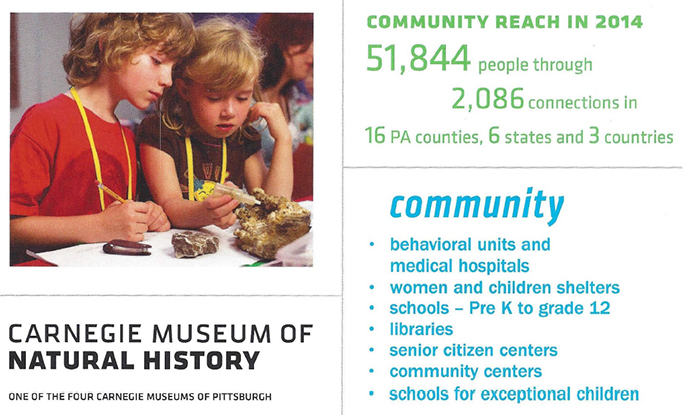
June 3, 2015 – Creative Aging
Aging Creatively
A Pilot Project between Pennsylvania Department of Aging, the Pennsylvania Council on the Arts, and Elders Share the Arts.
AGING IN PA – WHY NOW?
 Currently, Pennsylvania is the fourth “oldest” state in the nation, with nearly 2.7 million individuals aged 60 and older and more than 300,000 individuals aged 85 and older. By the year 2030, it is estimated to exceed 3.6 million Pennsylvanians will be aged 60 and older. Many of Pennsylvania’s older adults reside in the 48 of Pennsylvania’s 67 counties that are rural. Many live alone and some live at or below poverty level. Others suffer from one or more chronic health conditions. Additionally, there are many that are at risk of abuse, neglect, abandonment, or exploitation. Through outreach to its partners in the aging services network and, most importantly, to the consumers of its services and supports, the Department identified innumerable opportunities to address the needs of older Pennsylvanians. New goals will help the Commonwealth of Pennsylvania enhance the current system and continue to serve older residents through a high quality, cost-effective, responsive system that clearly makes Pennsylvania the best state in which to age.
Currently, Pennsylvania is the fourth “oldest” state in the nation, with nearly 2.7 million individuals aged 60 and older and more than 300,000 individuals aged 85 and older. By the year 2030, it is estimated to exceed 3.6 million Pennsylvanians will be aged 60 and older. Many of Pennsylvania’s older adults reside in the 48 of Pennsylvania’s 67 counties that are rural. Many live alone and some live at or below poverty level. Others suffer from one or more chronic health conditions. Additionally, there are many that are at risk of abuse, neglect, abandonment, or exploitation. Through outreach to its partners in the aging services network and, most importantly, to the consumers of its services and supports, the Department identified innumerable opportunities to address the needs of older Pennsylvanians. New goals will help the Commonwealth of Pennsylvania enhance the current system and continue to serve older residents through a high quality, cost-effective, responsive system that clearly makes Pennsylvania the best state in which to age.
WHY THE ARTS ARE GOOD FOR HEALTHY AGING
Despite the fact that the people who span different generations have varying life experiences, cultural references, and exposure to educational opportunities, they all share the same very human needs: to create, convene, learn, and express themselves. The arts are the perfect lens through which older adults may explore life and share their personal experiences with others. Creative aging focuses on the role of the arts in enhancing the quality of life for older adults. In 2006 a national research project conducted by Gene Cohen, M.D., Ph.D., Director of the Center on Aging, Health & Humanities at George Washington University in Washington, D.C. The study, titled “The Impact of Professionally Conducted Cultural Programs on Older Adults,” demonstrated that professionally conducted, sequential arts-learning programs promoted better health and disease prevention among older adults who actively engaged in them.
PENNSYLVANIA CREATIVE AGING PILOT PROJECT
This training brings together two Pennsylvania government agencies and a nationally-recognized arts organization to train 15 teams comprised of professional teaching artists, senior centers and community arts in education organizations in how to implement evaluate and sustain creative aging arts programs for older adults. This innovative three day training allowed two sectors to strengthen ties between two agencies. Understand expectations between partners; created deeper buy-in from senior center agencies; shared resources; expand knowledge of what is available and possible to centers.
ABOUT THE LEAD AGENCIES
The Pennsylvania Department of Aging leads the way in safeguarding and enhancing the lives of older Pennsylvanians, their families, and caregivers throughout the commonwealth. The Department’s mission is dedicated to enhancing the quality oflife of older Pennsylvanians by empowering diverse communities, the family, and the individual. At its foundation are prevention and protection: 1) Prevention from instability in health and well-being that may result in institutional care and dependence on government aid. 2) Protection from abuse, neglect, abandonment, and exploitation. The Pennsylvania Council on the Arts (PCA) is a state agency charged with fostering the excellence, diversity, and vitality of the arts and broadening the availability and appreciation of those arts throughout the state. It strives to make the arts available to all Pennsylvanians so they may enjoy the various benefits that can be gained from a vibrant arts infrastructure. These benefits include enhanced quality of life and occasions for intellectual and emotional discovery through engagement in the arts and in the creative process. Participation in the arts can also increase economic activity, promote tourism and offer substantial educational enhancements for children and youth. 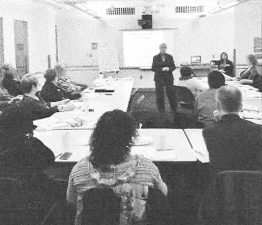 Activities that nurture creative aging can provide lasting health benefits for older Pennsylvanians and in senior centers and veterans homes foster a new standard for quality of care. The PCA distributes arts funding through more than 1,000 responsive grants; undertakes partnerships and initiatives to seek solutions to challenges, leverage opportunities, and serve a broad spectrum of arts participants, artists, and arts organizations; provides technical assistance; and, acts as a resource for arts related information.
Activities that nurture creative aging can provide lasting health benefits for older Pennsylvanians and in senior centers and veterans homes foster a new standard for quality of care. The PCA distributes arts funding through more than 1,000 responsive grants; undertakes partnerships and initiatives to seek solutions to challenges, leverage opportunities, and serve a broad spectrum of arts participants, artists, and arts organizations; provides technical assistance; and, acts as a resource for arts related information.
ABOUT THE TRAINING ORGANIZATION
Elders Share the Arts (ESTA), founded in 1979, is an award-winning community arts organization that has been at the forefront of reimagining the possibilities of growing older for over 35 years. Using art to create meaning and purpose in this last stage oflife, EST A’s professional teaching artists offer high-caliber evidence based arts programming that ignites creative expression, cultivates older adults’ role as bearers of history and culture, and generates new pathways to connect them to their communities.
Creativity and Aging Study
Research Study Findings
The Impact of Professionally Conducted Cultural Programs on the Physical Health, Mental Health, and Social Functioning of Older Adults, by Gene D. Cohen, MD, PhD, Susan Perlstein, MSW, Jeff Chapline, MFA, Jeanne Kelly, MM, Kimberly M. Firth, PhD, and Samuel Simmens, PhD
Overview
Purpose of the Study: to measure the impact of professionally conducted community-based cultural programs on the physical health, mental health, and social activities of individuals aged 65 and older.
Subjects: 300 people (living mostly independently) aged 65 to 100 (average age of 80) from three areas of the US (Brooklyn, NY, Washington, DC and San Francisco, CA). Half were assigned to the intervention group and half to the control group. The intervention group participated in various professionally run activities: writing, poetry, singing, dance, drawing and painting, to name a few. The control group was assessed on the basis of their usual activities. The study ran for three years beginning in 2001.
Assessment Tools: a total of five questionnaires measured three areas of functioning: 1) general assessment of health and problems across the systems of the body, medication usage and health care utilization data; 2) mental health assessment; and 3) social activities assessment, utilizing a detailed inventory of the subject’s activities, with attention to the nature, frequency and duration of the activities.
Findings: subjects in the intervention group reported a higher overall rating of physical health, fewer doctor visits, less medication use, fewer instances of falls, better morale, fewer feelings of loneliness, and a trend toward increased activity than did the control group.
Implications: the positive impact of participatory art programs for older adults in this study on overall health, doctor visits, medication use, falls, loneliness, morale, and activities reflects important health promotion and prevention effects and a reduction of risk factors driving the need for long-term care. Just 8 cents savings in medication use per person per day would save $1 billion a year for the Medicare D eligible population.
Study Sponsors: National Endowment for the Arts (lead sponsor), the Center for Mental Health Services of the Dept. of Health and Human Services, the National Institute of Mental Health of the National Institutes of Health, AARP and the National Retired Teachers Association, the Stella & Charles Guttman Foundation and the International Foundation for Music Research (NAMM).
The study was directed by Gene Cohen, M.D., Ph.D.,
Center on Aging, Health & Humanities, GWU
List of Senior Center involved in Pilot Program
| Creative Aging Pilot Program Offered in partnership with the Pennsylvania Department of Aging, Pennsylvania Council on the Arts, and the Long-Term LivingTraining Institute |
|||
| Center | County | Center Contact Person | Teaching Artist |
| Ebensburg Senior Activity Center 209 North Julian Street Ebensburg, PA 15931 |
Cambria | Tammy Monito, Center Director | Tom McCarty Music/Woodworking Lilly, PA 15938 |
| Kennett Area Senior Center 427 South Walnut Street Kennett Square, PA 19348 |
Chester | Andrea Durynski, Program Coordinator | Rhona Candeloro Visual Arts/Painter Phoenixville, PA 19460 |
| LifeWorks Erie 406 Peach Street Erie, PA 16507 |
Erie | Marie Heberlein, Staff | Thomas Ferraro Visual Arts/Painter Erie, PA 16502 |
| The Mercy Hilltop Center, Inc. 444 East Grandview Boulevard Erie, PA 16504 |
Erie | Deborah Kraus | Edward F. Grout Visual Arts/ Mosaics Erie, PA 16502 |
| Bellefonte Senior Resource Center 203 North Spring Street Bellefonte, PA 16823 |
Centre | Vickey Confer, Center Manager | Michele Randall Visual Arts State College, PA 16801 |
| Coudersport Senior Center 1004 South Main Street Coudersport, PA 16915 |
Potter | Sue Smith, Manager | Julie Mader Visual Arts Smethport, PA |
| Klein JCC 10100 Jamison Avenue Philadelphia, PA 19116 |
Philadelphia | Shelly Geltzer, Program Director | Cassandra Gunkel Folk Arts/Textile Arts Doylestown, PA 18901 |
| Elizabeth Seton Center, Inc. 1900 Pioneer Avenue Pittsburgh, PA 15212 Overbrook (satellite office of Seton Center) 2199 Dartmore Pittsburgh, PA 15210 |
Allegheny | Leslie Cejrawski | Adrienne Heinrich Interdisciplinary Arts Murrysville, PA 15668 |
| Dunmore Senior Citizens Center 1414 Monroe Avenue Scranton, PA 18509 |
Lackawanna | Jeanne Hugenbruch, Executive Director | Vince Brust Performing Arts/Dance Throop, PA 18512 |
| United Neighborhood Centers 1004 Jackson Street Scranton, PA 18504 |
Lackawanna | John Washicosky, Arts Coordinator | Earl Lehman Visual Arts/Painter Jessup, PA |
| Crispus Attucks Community Center 605 South Duke Street York, PA 17401 |
York | Robin Beatty-Smith | Jenny Hill Poetry Lancaster, PA 17602 |
| Penn Hills Senior Service Center 147 Jefferson Road Pittsburgh, PA 15235 |
Allegheny | Phyllis Ann Paciulli | Walt Peterson Literary Arts/Writer Pittsburgh, PA 15217 |
| Hill House Senior Services Center 2038 Bedford Avenue Pittsburgh, PA 15219 |
Allegheny | Karen McDonald | Maritza Mosquera Interdisciplinary Arts Pittsburgh, PA 15206 |
| Eastern Area Adult Services 607 Braddock Avenue Turtle Creek, PA 15145 |
Allegheny | Linda Doman, Executive Director | Jeff Gordon Performance Artist Pittsburgh, PA 15206 |
PA Creative Aging Pilot Project 2015
Project Example from Crispus Attucks Senior Center in York, PA. This collaboration between the PA Dept. of Aging and the PA Council on the Arts was developed to bring new opportunities to seniors by providing arts learning opportunities. The 14 projects in this first phase created engaging, accepting and inspiring environments at senior centers across the state.
April 23, 2015 Meeting – EITC and Film Tax Credit
Pittsburgh Film Office Industry Report :: May 2015
Economic Statistics of the Film Industry (Southwestern Pennsylvania)
- Since 1990, the Pittsburgh Film Office has assisted with:
- 135 Feature Film and Television Productions
- $900 Million in economic impact in southwestern Pennsylvania
- From 2009 to the present:
- Over 116,000 Hotel Room Nights utilized by the film industry – Over 20,000 in 2014 alone
- A typical film production will utilize $500,000 in car rentals
- Over $554 Million in economic impact
- The economic impact of the film industry has averaged $100 million annually for the last 6 years.
- IATSE 489, the local film union, has reported a 400% increase in membership since 2007
- Employment:
- SW PA has 4 full feature-size crew for film production. Approximately 1,000 people work in the film industry in the region
- A typical film production will hire 200 local film workers on a full-time basis
- Return on Investment
- Since 1990, the Pittsburgh Film Office has returned $175 in economic development for every $1 in government support of office operations
A. Economic Impact of the Film Industry in Southwestern Pennsylvania (1995 – 2014)
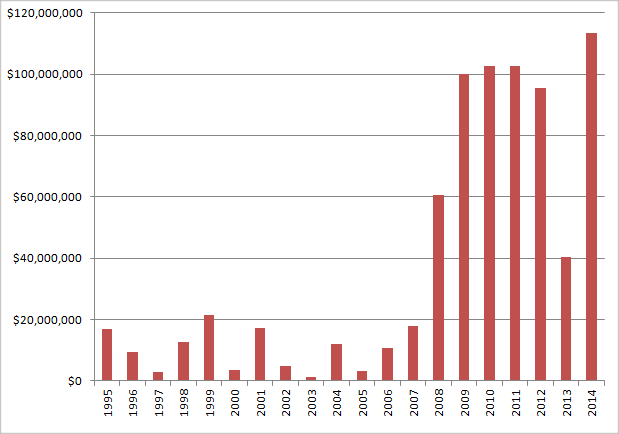
The State of the Film Industry in Southwestern Pennsylvania
- Currently the 15/16 budget includes $60 million for the Film Tax Credit
- For the first time ever, southwestern PA has TWO TV series in town at the same time
- “The Outsiders” – Sony Television to air on WGN America
- “Banshee” – HBO is producing to be aired on Cinemax – production was based in North Carolina until NC cut their film tax credit so the production left
- American Pastoral is scheduled to begin production at the end of the summer
- The Film Tax Credit is underfunded. Typically, the Film Tax Credit program is fully committed in just 6 months. Dozens of film productions are turned which results in the loss of at least $200 million in potential film production
- Pittsburgh is busy right now! This is great because television provides long-term employment for our talented local crew , and allows for more internal workforce training so that people can move up and television also provides a longer, sustainable benefit to our region’s economy
- With the uncapping of the tax credit, tens of millions of dollars would be spent in the local economy by film productions
